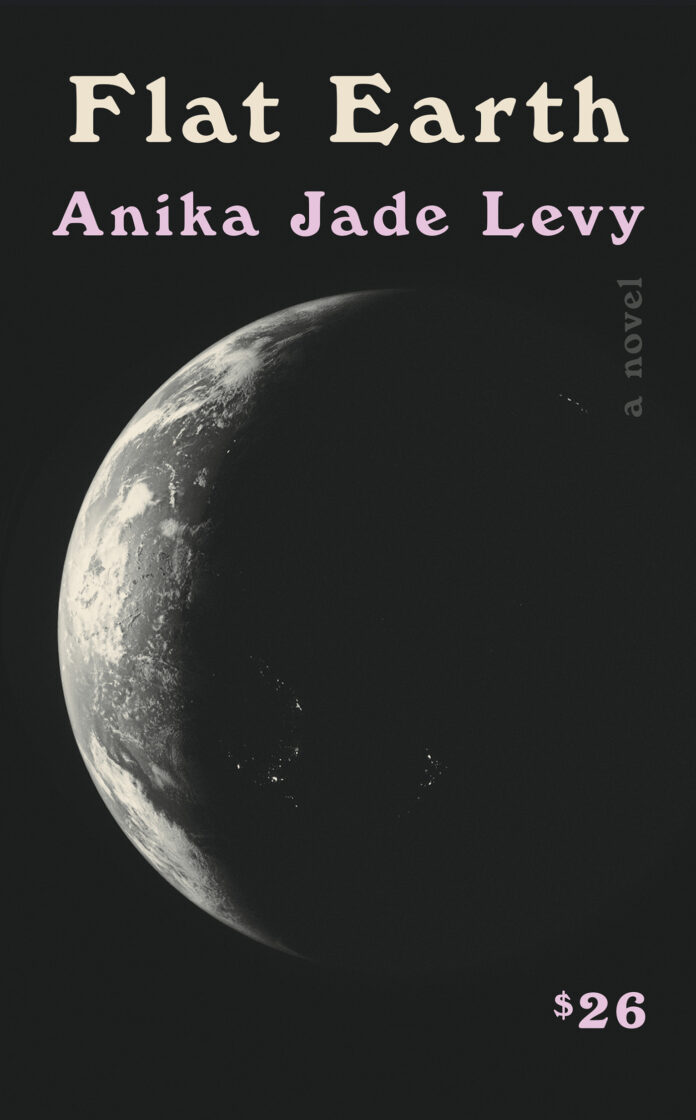Avery, a grad school writer who doesn’t write, is addicted to prescriptions while toiling in the shadow of her best friend, Frances, whose film on small-town psychoamericana is much more revealing than her status reports Avery writes for a right-wing dating app. When Frances sends her the final cut of her movie, Flat Earth, Avery freaks out. “My only accomplishments were a maxed-out credit card I used to cut up stimulants and the initials of a man I hated carved into my chest,” she thinks.
Sound familiar? There are two genres of literary fiction that irk me: the MFA novel, a usually tender work of family and placid conversations that feel reworked to catch Oprah or Reese Witherspoon’s eye for a movie adaptation, and the New York novel, a disaffected, bare thing of skeletal prose about a narrator’s dissatisfaction with life. Anika Jade Levy’s debut falls into this camp, with Avery tottering around art shows, following Frances around, going on dates with older men and feeling bad about it. “I started taking pseudoephedrine and trying to write a few hundred words every day,” one paragraph starts. “I wanted new clothes, but my credit cards were maxed out. I missed Frances, but I only called her to complain. I tried to skim the newspaper, to concern myself with world events, but I had forgotten how to read without stimulants.” After a while, this can get sort of numbing.
Levy’s style is punchy but bare — “When I did manage to write, there was no plot, just prose,” Avery writes. “I told myself this was because I was a socialist or something, uninterested in the commercial potential of books.” Later she mentions not being one of those writers who insists on “colonizing the empty page.” The prose resembles the druggy stream-of-consciousness Ottessa Moshfegh used for her sad-girl blueprint My Year of Rest and Relaxation mixed with quip-laden books by Jenny Offill and Patricia Lockwood, two writers who (with mixed results) try to capture the cheeky ego-melting process of living your life through your phone. But sometimes Avery confuses tweetability with astuteness, and it results in some dull lines: “I imagined all the skyscrapers penetrating me,” she thinks, or “I felt confused because I didn’t really know the difference between love and money,” which feels like a parody of a Lana Del Rey song. When she’s at a party and suggests she “should have double-majored in sucking cock and carrying Narcan,” her conversational partner pivots.
That being said, Levy does keenly hit on some small doses of contemporary American life — whether in the literary world or not — that feels indicative of the sort of world she’s trying to conjure, one of near-future obliteration via short form video-propagated conspiracy theories and general insanity. The United States is now the land of teaching mothers how to buy Instagram followers, confederate flag bikinis, 3D-printed assault rifles, women who use in-flight entertainment to watch planes blowing up, or a “culturally sensitive globe” on a law professor’s desk that “paid special attention to historically disputed territories.” “I heard that book has a good rape in it,” someone named Forrest says. These images are striking, poky, and often very funny.
The best moments come when Avery is at her lowest; on her knees, figuratively or literally. She awkwardly tries to demonstrate her Roberto Bolaño tattoo to a man who named the author as one of his influences in an Artforum interview (she herself had never read him). And during one writing class, she turns in a story about a long-lasting magic lipstick that still holds after fifty blowjobs. “Can I give you a piece of advice?” the teacher tells her. “I don’t think you should write about your own life.”
At the beginning of the novel, when Avery is touring around middle America with Frances to gather footage for her documentary, the vignettes are free-flowing, capturing something vague and essential. “I feel like I’m really learning something about America,” Alexandra Tanner writes in Jewish Currents for her Covid-induced mommy-blogger internet spiral, a line I use frequently and one I thought about while Levy depicts people on the edge whose lives have been rattled by politics and/or the internet. Avery and Frances wander around “postindustrial towns ravaged by QAnon and synthetic opioids and dead factories,” speaking with eugenicists or radicals, learning each others’ rhythms, like which books they keep on their hotel nightstands and don’t read, and “trying to make something really American,” which sort of mirrors Tanner’s line. It works — these scenes are vivid and lush, even if they are describing relative depravity. But back in the city, the worldview seems to fizzle. If this is a strategy — mirroring Avery’s own resentment with her own life — it is not a particularly exciting one to read, even if it is clever. The high dissipates in New York, and you’re left wishing you could come back.
Maybe we are just inundated with novels about New York City life that a new one doesn’t, on first arrival, seem to present anything new to say about the area or culture. There are pretentious sculptors and bad friends and awkward sex, this we know. Flat Earth, Frances’ documentary, is something special; we sense Avery’s jealousy as she goes from event to event, trying to re-create the magic of discovering something new. “I wanted something to happen to me,” Levy writes at one point. “The essential thing was to get out of New York.” Seems like a good place to start.
Flat Earth is out now.

